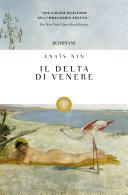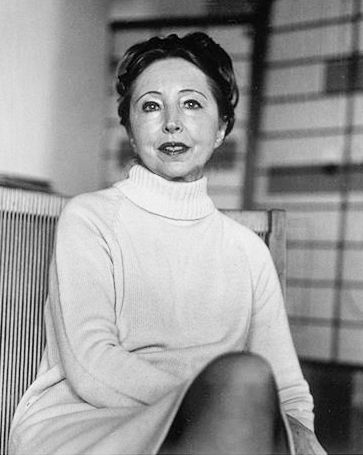dalla prefazione a Il Delta di Venere
Lavori

Il delta di Venere
Anaïs NinDiario di Anaïs Nin
Anaïs NinAnaïs Nin frasi celebri

“Solo i battiti uniti del sesso e del cuore insieme possono creare l’estasi.”
libro Il delta di Venere

Frasi sulla vita di Anaïs Nin
Frasi sul sesso di Anaïs Nin
Anaïs Nin Frasi e Citazioni

Origine: Il delta di Venere, Elena, p. 105; 2012
“Viaggiamo per cercare altri luoghi, altre vite, m altre anime.”
The Diary of Anaïs Nin, Vol. 7: 1966-1974
“La colpa è proprio l'unico fardello che gli esseri umani non possono sopportare da soli.”
Origine: Una spia nella casa dell'amore, p. 6
Origine: Una spia nella casa dell'amore, p. 133
Origine: Il delta di Venere, L'avventuriero ungherese, p. 16

Origine: Il delta di Venere, Il Basco e Bijou, p. 174
Origine: Il delta di Venere, Marcel, p. 271
Origine: Il delta di Venere, Elena, p. 130; 2011
Origine: Il delta di Venere, Pierre, p. 229
Origine: Una spia nella casa dell'amore, p. 119
Origine: Il delta di Venere, Elena, p. 123; 2012
Origine: Il delta di Venere, Il collegio, p. 38
Anaïs Nin: Frasi in inglese
Frequently attributed to Nin, but without cited source in her work (possibly due to a quotation in Living on Purpose: Straight Answers to Universal Questions (2000) by Dan Millman that attributed the quote to Nin without source).
In March 2013, a former Director of Public Relations at John F. Kennedy University in Orinda, Elizabeth Appell, claimed she had authored the quote in 1979 for an inspirational header on a class schedule: http://anaisninblog.skybluepress.com/2013/03/who-wrote-risk-is-the-mystery-solved/
Disputed
Variante: The day came when the risk to remain tight in a bud was more painful than the risk it took to blossom.
“We don't see things as they are, we see things as we are.”
The Seduction of the Minotaur (1961); the documentation of the conflicting citations available on this page ( HNet http://h-net.msu.edu/cgi-bin/logbrowse.pl?trx=vx&list=H-Judaic&month=1108&msg=RizwZWCgeA8woVU9mNOEYQ) seems very thorough, and in the end attributes the quote to this novel, which includes the line:
Lillian was reminded of the talmudic words: "We do not see things as they are, we see them as we are."
With Nin's description of the statement as "Talmudic" it afterwards began to be attributed to the Jewish Talmud, without any cited version or passage.
Similar statements appear in You Can Negotiate Anything (1982) by Herb Cohen: "You and I do not see things as they are. We see things as we are"; and in Awareness (1992) by Anthony de Mello: "We see people and things not as they are, but as we are".
Another similar statement without cited source is also attributed to Nin https://web.archive.org/web/20050322041559/http://learn-gs.org/learningctr/tutorial/4.html: We see the world as "we" are, not as "it" is; because it is the "I" behind the "eye" that does the seeing.
Disputed
Variante: We don't see people as they are. We see people as we are.
Origine: Little Birds
“You cannot save people, you can only love them.”
The Diary Of Anais Nin, Volume Two (1934-1939)
Diary entries (1914 - 1974)
“I believe one writes because one has to create a world in which one can live.”
February 1954 The Diary of Anaïs Nin Vol. 5 (1947-1955), as quoted in Woman as Writer (1978) by Jeannette L. Webber and Joan Grumman, p. 38
Diary entries (1914 - 1974)
Contesto: Why one writes is a question I can answer easily, having so often asked it of myself. I believe one writes because one has to create a world in which one can live. I could not live in any of the worlds offered to me — the world of my parents, the world of war, the world of politics. I had to create a world of my own, like a climate, a country, an atmosphere in which I could breathe, reign, and recreate myself when destroyed by living. That, I believe, is the reason for every work of art.
Origine: Fire: From A Journal of Love - The Unexpurgated Diary of Anaïs Nin
“We write to taste life twice, in the moment and in retrospect.”
February 1954 The Diary of Anaïs Nin, Vol. 5 as quoted in Woman as Writer (1978) by Jeannette L. Webber and Joan Grumman, p. 38
Diary entries (1914 - 1974)
Contesto: We write to taste life twice, in the moment, and in retrospection. We write, like Proust, to render all of it eternal, and to persuade ourselves that it is eternal. We write to be able to transcend our life, to reach beyond it.
Contesto: The artist is the only one who knows that the world is a subjective creation, that there is a choice to be made, a selection of elements. It is a materialization, an incarnation of his inner world. Then he hopes to attract others into it. He hopes to impose his particular vision and share it with others. And when the second stage is not reached, the brave artist continues nevertheless. The few moments of communion with the world are worth the pain, for it is a world for others, an inheritance for others, a gift to others, in the end. When you make a world tolerable for yourself, you make a world tolerable for others.
We also write to heighten our own awareness of life. We write to lure and enchant and console others. We write to serenade our lovers. We write to taste life twice, in the moment, and in retrospection. We write, like Proust, to render all of it eternal, and to persuade ourselves that it is eternal. We write to be able to transcend our life, to reach beyond it. We write to teach ourselves to speak with others, to record the journey into the labyrinth. We write to expand our world when we feel strangled, or constricted, or lonely. We write as the birds sing, as the primitives dance their rituals. If you do not breathe through writing, if you do not cry out in writing, or sing in writing, then don't write, because our culture has no use for it. When I don't write, I feel my world shrinking. I feel I am in a prison. I feel I lose my fire and my color. It should be a necessity, as the sea needs to heave, and I call it breathing.
“Life shrinks or expands according to one's courage.”
As quoted in French Writers of the Past (2000) by Carol A. Dingle, p. 126
Variante: Life shrinks or expands in proportion to one's courage.
“I hate men who are afraid of women's strength.”
Origine: Henry and June: From "A Journal of Love"--The Unexpurgated Diary of Anaïs Nin
“The role of the writer is not to say what we can all say, but what we are unable to say.”
The Diary of Anaïs Nin, Vol. 5, as quoted in Moving to Antarctica : An Anthology of Women's Writing (1975) by Margaret Kaminski
Diary entries (1914 - 1974)
Contesto: The role of the writer is not to say what we can all say, but what we are unable to say. Most of the writing today which is called fiction contains such a poverty of language, such triteness, that it is a shrunken, diminished world we enter, poorer and more formless than the poorest cripple deprived of ears and eyes and tongue. The writer's responsibility is to increase, develop our senses, expand our vision, heighten our awareness and enrich our articulateness.
February 1947 The Diary of Anaïs Nin Vol. 4 (1944-1947), p. 185
Diary entries (1914 - 1974)
“People living deeply have no fear of death.”
The Diary Of Anais Nin, Volume Two (1934-1939)
Diary entries (1914 - 1974)
“We travel, some of us forever, to seek other states, other lives, other souls.”
Origine: The Diary of Anaïs Nin, Vol. 7: 1966-1974
“Most artists have retired too absolutely; they grow rusty, inflexible to the flow of currents.”
November 26, 1932
Diary entries (1914 - 1974)
Contesto: This abdiction of life demanded of the artist is to be achieved only relatively. Most artists have retired too absolutely; they grow rusty, inflexible to the flow of currents.
March 1937
Diary entries (1914 - 1974)
Origine: The Diary of Anaïs Nin, Vol. 1: 1931-1934
